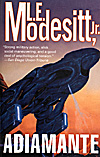 Published by Tor, 1996
Published by Tor, 1996
paperback, $6.99 ISBN 0-812-54558-3
312 pages
Utopia is such a hard act to top. Pity the cyber-warriors, exiled for the last 10,000 years from an Earth they believe to be a utopia. And yet, the rest of the universe believes the rumors that Earth is "a planet of death."
So in fleets and armor crafted from adiamante, the hardest known man-made substance, these borg bent on conquering Eden pop over the planet, set their attack patterns, and...descend to an official reception bidding them welcome. Well, almost a welcome. More like a reluctant leader wishing they would go away before they destroy themselves out of ignorance. And if there is one thing that borg in any sci-fi setting fail to do, it is listen to others.
Modesitt crafts an exceptionally fine Earth, battered by mutations arising from a war 10,000 years in the past. His is an ecosystem of death, filled with imaginative descendants of bears, eagles, and prairie dogs--exceptionally nasty descendants. Only a small group of humans exist, led by an even smaller subset with mutated mental powers, and territories are clearly delineated and observed. Those that overreach themselves, well, Earth maintains its balance.
But of greater intrigue is the social hierarchy Modesitt posits for those few million survivors scattered across the continents. Certainly there is an underlying sense of power, as well as an acceptance of controlled markets, similar to Communist-style socialism. Yet, labor is the currency of the planet, with luxuries purchased through hours of "compensatory time." The higher up in the hierarchy, the more comp time expected of you, like some pale form of free market economy.
"It's simple enough. The Consensus chose me."
"What is the Consensus exactly? Some sort of representative body?"
"That's close enough, although...that's not it exactly, either. Locials [towns] and regions have Consensus representatives, and the representatives are the ones that make the choices." I wasn't ready to explain all the checks and balances, and the exponential compensatory time required. I almost shuddered at how many years it would take me to work off having been Coordinator.
"Did you seek the position?"
"Hardly. It's not the sort of position anyone seeks--and anyone who did would be suspect."
"How do you get good leadership if no one wants the job?"
"Fear," I laughed. "People accept the positions, if they're good, because they fear the alternatives if they don't do their best. It doesn't always work, but it works better than anything we've tried." (p.90) As Ecktor, the main character and Coordinator, attempts to open borg sensors to the idea that leaving Earth alone is their best option, the cloak and dagger efforts behind the shield of diplomacy race against the clock. Can the cyber-warriors deploy their weapons before Earth's defenses are ready? Can the Coordinator coordinate mass evacuations to shelter and put his "military" resources in order?
This finely balanced tale never skips a beat as the tightly knit actions and reactions draw you deeper into the Earth's devastating background and mutated recovery. If the borg seem single-minded, you just have to accept that some technologically advanced species survive on power alone, rather than reason. Utopia never seemed to be this vicious--or entertaining.
This article appears in MagWeb (Magazine Web) on the Internet World Wide Web.
"You never said how you became [planetary] Coordinator."
Back to List of Book Reviews: Military Science Fiction
Back to Master Book Review List
Back to MagWeb Master Magazine List
© Copyright 1998 by Coalition Web, Inc.
Other military history articles and gaming articles are available at http://www.magweb.com